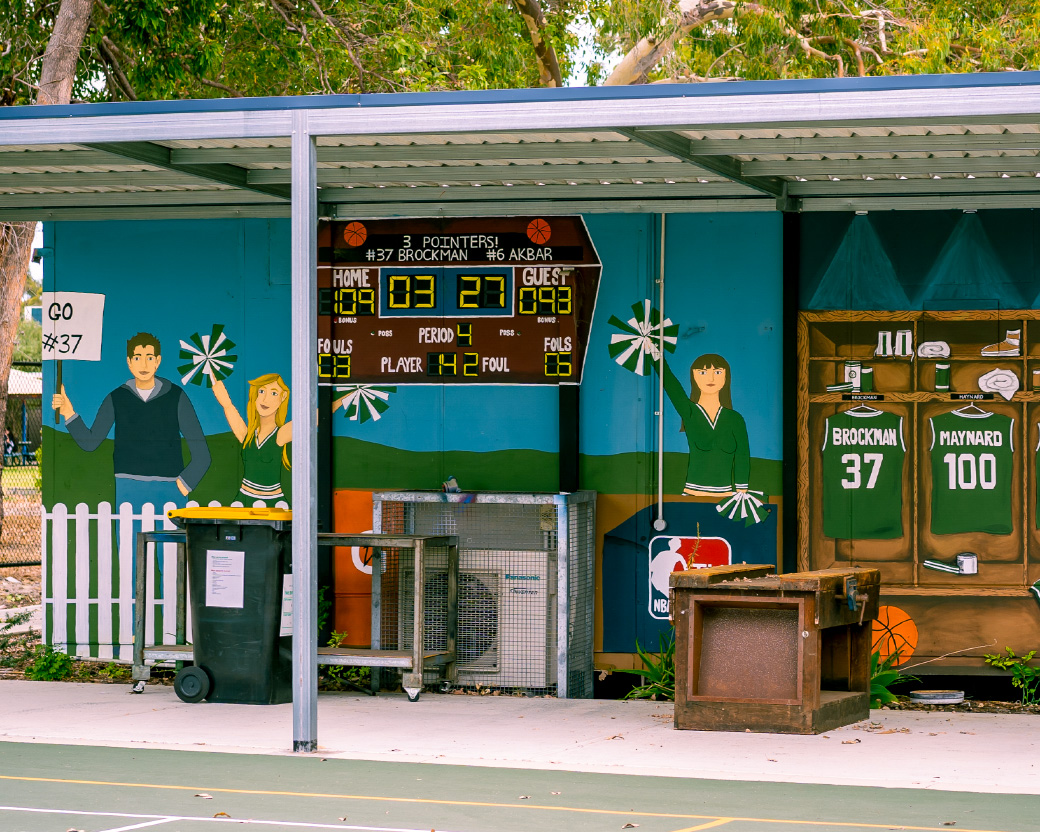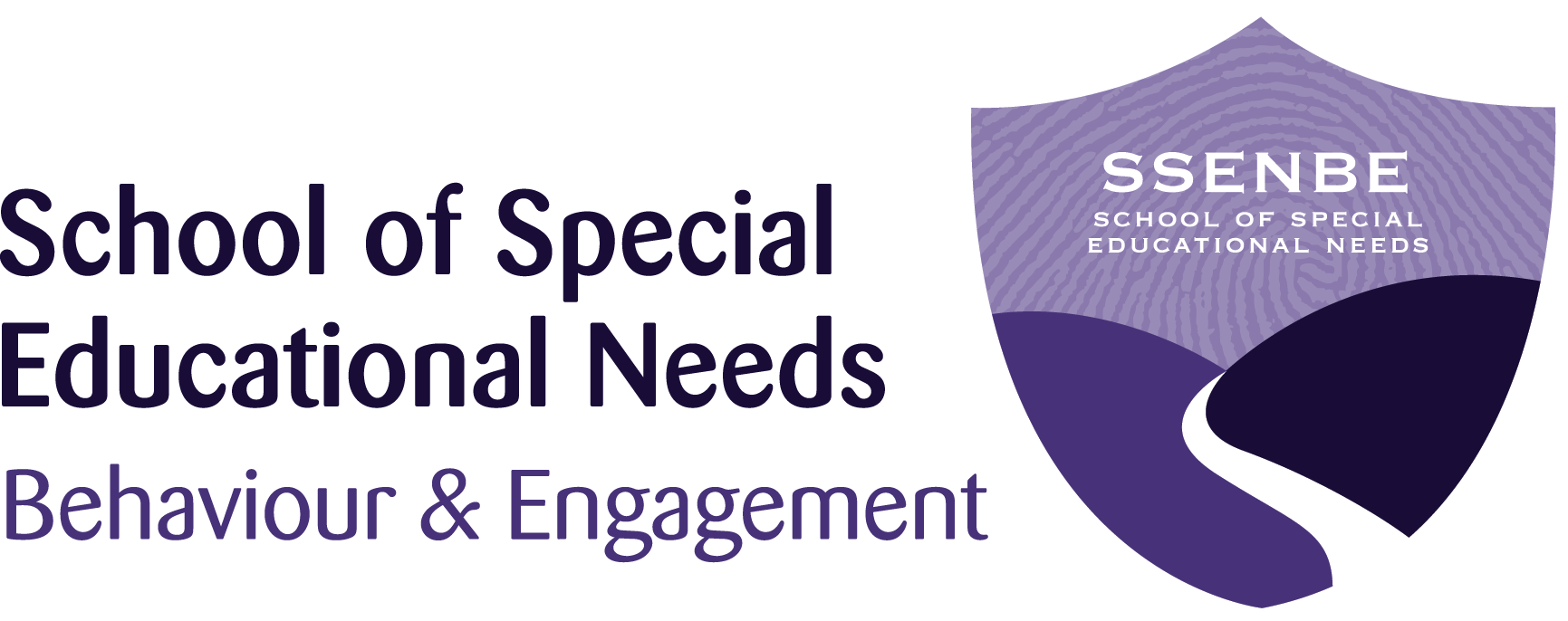
For Schools
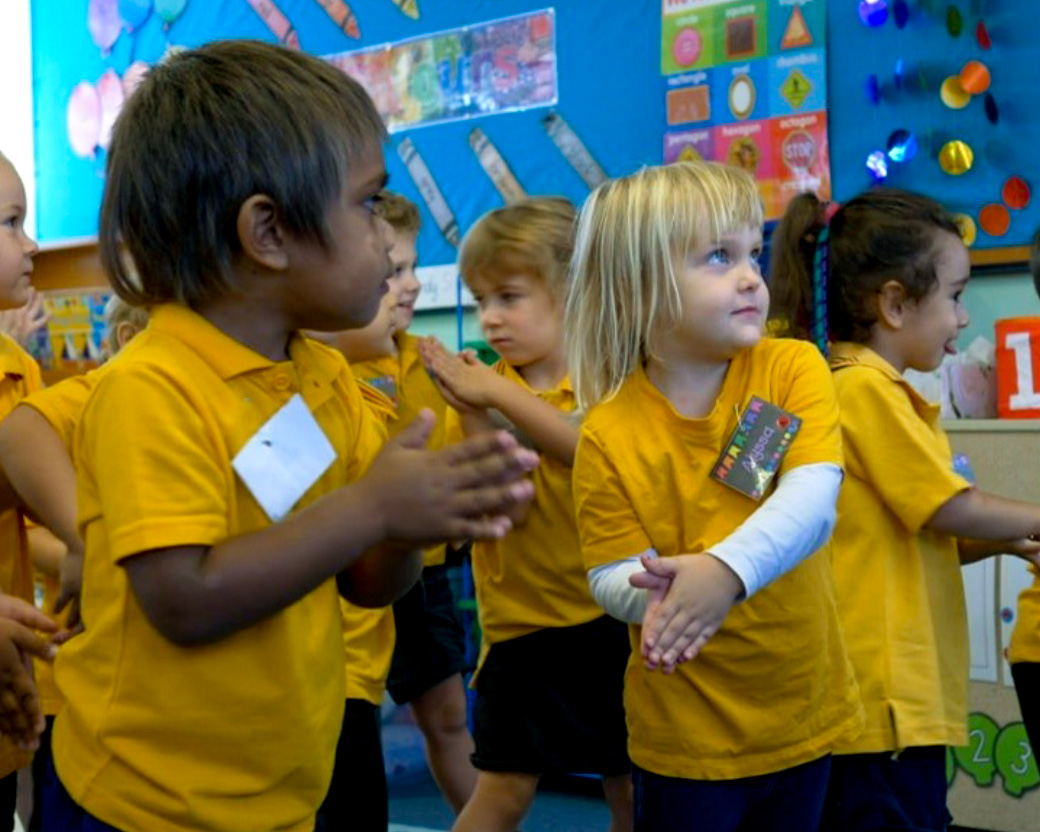
The Department of Education’s Student Behaviour in Public Schools policy states;
Creating, safe, orderly, inclusive, supportive and culturally responsive environments that enable students to fulfil their learning potential is a responsibility shared by all members of the public schooling system and each school community.
Positive student behaviour is essential to promote engagement in learning and to maximise the impact of classroom teaching.
Student Behaviour in Public Schools Policy v3.0

Familiarise yourself with Statewide Services Prioritisation Framework;
- Understand support from Statewide Services – Ikon – The Department of Education
- Prioritising requests for Statewide Services’ support from schools and regions
There is an expectation that every Department of Education school will foster positive relationships with parents and students through regular communication, creating connection and belonging for children and young people, building a school community of positive culture.
All children and young people have the potential to successfully engage with learning and lead healthy, happy, and productive lives.
Schools seeking support from SSEN:BE should demonstrate evidence of:
- Identification of individual student needs
- Cycles of assessment, planning and implementation of school-based support that address the identified needs
- Engagement with local and regional expertise/supports
- Engagement with external agencies and experts, as required
- Planning informed by student and family voice
Expectations of Schools in Service Provision
SSEN:BE services aim to build capacity within schools, by supporting development of staff knowledge and skills, and school processes and systems.
- A collaborative approach is used, engaging school staff, parents/carers, and other relevant intra- and inter-agency partners in problem clarification and intervention planning
- The expectation is that schools will make available time and resources to engage in collaborative processes
- The school retains primary responsibility for the case management of individual students who receive support
Service Provision Model (SPM)
The Service Provision Model describes the flow of service from RFA to exit from service, and outlines the purpose, processes and required documentation in each phase. SSEN:BE staff are introduced to the SPM during formal Induction training. Further coaching, modelling and work shadowing opportunities are part of continuous induction in ECs and teams, consolidating knowledge and practical application of learning.
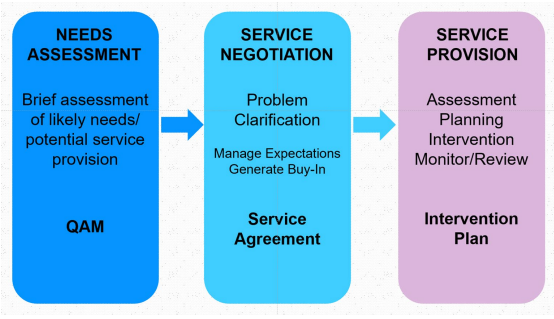
Sharing of Information
Schools can support the work of SSEN:BE by sharing key contextual information of their student’s:
- levels of engagement
- their ability to emotionally regulate
- their capacity to build and maintain relationships and
- their skill set to manage and resolve conflict within the classroom and school environment
This may occur through individual consultations, classroom observations or requests to inform diagnostic assessment tools.
Professional Learning
While in active service provision, SSEN:BE staff play a key role in supporting school staff;
- to build their own capacity to understand and manage challenging behaviours
- provision of ongoing professional upskilling
- access to relevant professional learning
- consultation around implementing suggested frameworks and strategies through a case formulation led approach that streamlines documented plans
Themes of PL:
- CMS
- WA PBS
- Trauma Awareness Training Modules 1 – 4
- Managing and Responding to Challenging Behaviours
- De-escalation and Positive Handling
- Cycles for Individual Behaviour Support Planning
- Other bespoke packages based on school and region identified needs
Professional learning – Ikon – The Department of Education
- https://ikon.education.wa.edu.au/professional-learning/
- Access positive behaviour support professional learning – Ikon – The Department of Education
- Access information and support for positive behaviour – Ikon – The Department of Education
- Access classroom management strategies professional learning – Ikon – The Department of Education
- Access de-escalation and positive handling training – Ikon – The Department of Education
- Access student engagement professional learning – Ikon – The Department of Education
Classroom Management Strategies (CMS) and Western Australian Positive Behaviour in Schools (WA PBS)
The School of Special Educational Needs: Behaviour and Engagement (SSEN:BE) designs, facilitates and delivers professional learning to Western Australian public schools through Classroom Management Strategies (CMS) and Western Australian Positive Behaviour Support (WA PBS).
SSEN:BE Teacher Behaviour- Professional Practice staff deliver a range of supports to schools and public education staff. This includes professional learning, consultative support to schools and individualised assistance to teachers using a Multi-Tiered System of Support (MTSS), promoting cultural responsiveness and restorative practices and approaches identified in the 2023 WA Department of Education Student Behaviour Policy.
Classroom Management Strategies (CMS)
Professional learning in Classroom Management Strategies (CMS) supports school staff to:
- build positive classrooms and learning environments.
- design engaging teaching and learning experiences.
- manage student behaviour in a proactive, preventative, educative and restorative manner.
SSEN:BE offers a range of Classroom Management Strategies (CMS) Professional Learning Programs that schools can access. The professional development aims to grow professional teaching practice in ways that improve all students’ engagement, learning and well-being. Delivery focuses on using evidence-based behaviour support and interactive instructional strategies that increase students’ active participation and classroom engagement, leading to improved social behaviour and outcomes for students and schools.
CMS uses a model of professional learning designed to promote skill transfer to the classroom. For the Foundation and Instructional Strategies for Engagement programs, teachers participating in the professional learning attend three one-day workshops and participate in three conferences based on classroom observations.
SSEN:BE Teacher Behaviour- Professional Practice conduct these conferences and lead a reflective process based on observations and skills presented at the workshop.
- Foundation Program professional learning provides information and practical classroom management strategies to improve student engagement and reduce unproductive behaviour by establishing positive, proactive classroom environments. The skills-based professional learning focuses on developing the following:
- an increased competence and confidence to support students’ social behaviour and engage them in learning.
- a common language to discuss unproductive student social behaviour and teachers’ own practices to improve student outcomes.
- a shared set of beliefs about student social behaviour.
- a collegiate culture that fosters a sense of belonging and inclusion, supporting staff wellbeing.
- Instructional Strategies for Engagement provides skills-based professional learning to support teachers in designing engaging teaching and learning experiences. The skills-based professional learning focuses on developing the following:
- increasing awareness and comprehension of a range of instructional skills and strategies available to classroom teachers and the positive impact on student outcomes.
- increasing the capacity and confidence of teachers to select, apply and evaluate appropriate instructional skills and strategies as tools to engage students in learning.
- recognise that creating a consistent, positive, engaging classroom includes effective classroom management skills.
- The Education Assistant Modules provide Allied Professionals with professional learning focused on interactive instructional strategies. These modules aim to increase capacity to support teachers and engage students in their learning. The skills-based professional learning focuses on developing the following:
- competence and confidence to engage and support student behaviour.
- confidence to communicate with teachers to understand their role in the classroom.
- a common language to discuss student behaviour with teachers.
- a shared set of beliefs about student behaviour.
- a collegiate culture that fosters a sense of belonging and inclusion, supporting staff wellbeing.
- an awareness and understanding of teaching skills to effectively deal with escalating behaviour.
- an awareness and understanding of instructional and collaborative skills.
Schools are supported to adopt whole school practices to increase educators’ awareness of their professional practice, develop a common language to describe their teaching practice, engage in professional discussion and expand their repertoire of strategies designed to support student behaviour, engagement, and success.
Other professional development opportunities offered by SSEN: BE through the Teacher Behaviour – Professional Practice team include:
- Conference Accreditation Training supports educators to develop positive, objective, nonjudgmental skill-focused observation, and conferencing skills.
- Goal Setting and Effective Feedback Workshops provide opportunities for teachers to self‑reflect on their teaching practices as a tool for self‑development to better describe and analyse their own classroom actions. This allows teachers to target specific classroom outcomes identified through goal setting, consultation and analysis of classroom and school data.
- Professional Learning Teams Workshops support the development of professional skills through self-reflection and analysis of their classroom practice. The model is team based involving planning, observation and reflection phases.
- Design, facilitation and delivery of professional learning to meet the needs of individual schools and school networks. SSEN: BE supports schools and educators across Western Australia to meet the needs of students and provide them with a pathway to a successful future.
In addition, professional learning is also available online in particular the Promoting Student Engagement program accessed through IKON.
Western Australian Positive Behaviour Support (WA PBS)
WA PBS supports the implementation of the 2023 WA Department of Education Student Behaviour Policy. The policy includes the following information “Creating, safe, orderly, inclusive, supportive and culturally responsive environments that enable students to fulfil their learning potential is a responsibility shared by all members of the public schooling system and each school community. Positive student behaviour is essential to promote engagement in learning and to maximise the impact of classroom teaching.”
The main areas of the policy encompass student engagement, incorporating restorative practices, systems and principles and utilising a multi-tiered system of support.
WA PBS is also supported by the yearly Focus documents and Strategic Directions for Public Schools 2020-2024 “Every student, every classroom, every day”.
WA PBS provides an operational framework to build a multi-tiered system of supports for staff and students and a whole school community. The WA PBS framework focuses on using preventative, educative and restorative principles and develops a consistent whole-school approach embedding a common language regarding positive behaviour expectations, learning and teaching.
WA PBS acknowledges the impact on student behaviour of the classroom teacher, the multitude of student variables, the physical environment, and curriculum which includes pedagogy. It also acknowledges the influences of the home, socio-economic situation, cultural backgrounds, class, whole school community and the wider community. WA PBS recognises the importance of creating classrooms with high academic engagement, which supports an integrated approach to behaviour.
WA PBS utilises a strength-based lens to identify preventative, proactive strategies and logical consequences that are contextually relevant. Th
WA PBS builds a continuum of supports for staff and students with an emphasis on building relationships. It is a decision-making framework that guides selection, integration and implementation of the best evidence based practices for improving academic and behaviour outcomes for all students.
Schools implementing PBS build on existing strengths, complementing and organising current programming and strategies. WA PBS is unique in highlighting an ecological approach to the understanding and implementation of the components.
WA PBS has 3 Key Ideas for implementation using the Three Tier Continuum (MTSS), the WA PBS Framework and using an Ecological Approach.
The Three-Tiered Continuum of Behaviour Support
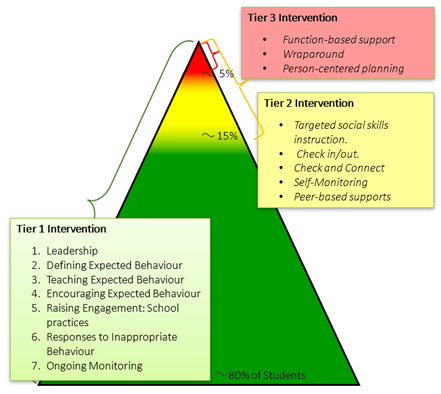
- Tier 3: Intensive practices and systems for students whose behaviours have been documented as not responsive at tiers 1 and 2. Individualised to the specific needs and strengths of the student
- Tier 2: Specialised practices and systems for students whose behaviours have been documented as not responsive at tier 1. Generally provided in a standardised manner in small student groupings.
- Tier 1: Practices and systems for all students and staff implemented across all school settings.
Other Specialist School Supports
SSEN:BE is part of Statewide Services, Service Delivery Directorate and forms part of the specialist schools network to support students with special learning needs.
If you believe the service you require for a student may involve a number of services offered through Statewide Services, understand the supports then raise a request.
These specialist services include:
Collaborative Approach
Best practice in supporting these students includes the collaborative co-design of behaviour support and learning plans that engages the voice of the student, their family, key school staff and relevant agencies.
Implementing these plans with fidelity across the school system allows young people to experience a level of support that invariably leads to;
- increased positive engagement
- a reduction in challenging behaviours
- an increased sense of belonging and connection to their school
Creating positive outcomes
Schools play a pivotal role in creating an environment within their school that fosters a collaborative evidence-based approach to supporting positive student behaviour and engagement.
These daily interactions and relational experiences of students and staff in schools can influence the teaching, learning and wellbeing outcomes for both, and has the potential of having a greater impact across a young person’s life that reaches far beyond the school setting.
